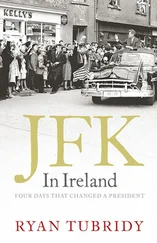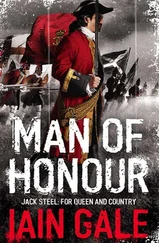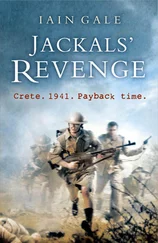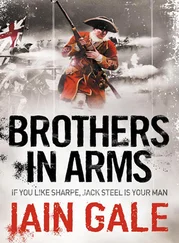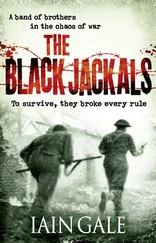Macdonell said nothing. Hoping that the men had not heard the Belgian’s halting English and ignoring the alternately ecstatic and bewildered civilians, he led the two light companies along the street and within a few minutes had arrived at the end of the town. He gave the order to return bayonets to scabbards and sent a runner back to battalion headquarters to report that no contact had been made with the enemy. To his surprise, the man returned almost immediately with the order to stand down. As the light companies moved off the road and once again began to unshoulder packs and prepare their rations, Macdonell heard again, quite clearly, the sound of gunfire. Surely this was no time to make camp?
He was on the point of riding to the adjutant to enquire of the decision when past him, at full pelt, coming from the direction of Quatre-Bras, rode two men on foam-flecked horses. One he recognized as George Scovell, of Wellington’s staff, the other as an officer of Scovell’s cavalry staff corps – Wellington’s messengers. A few minutes later they rode back and, to his surprise, straight up to him. Scovell addressed him:
‘Colonel, you are to proceed immediately in the direction of Les Quatre-Bras. Lord Wellington’s forces are engaged in battle and you must join them with all speed. On arriving on the field you will see that the French have the object of gaining a large wood to your right. This is the Bois de Bossu. Should they do so they will hold this road and with it our flank and the key to Brussels. You must at all costs prevent this being done. The light companies will be the first to arrive. Yourself and those of the First Guards. You must hold the wood until relieved by the remainder of the division. Is that clear?’
‘Quite clear, sir. You may depend upon it.’
Without another word Scovell and his companion turned and were gone.
Macdonell gave the order to march and once again, and with an audible collective groan, the campfires were extinguished, the half-cooked rations abandoned.
Back on the road, leaving the town behind them, the division continued to advance in the direction of Quatre-Bras. It was mid-afternoon now and the shadows were growing longer. With every step the guns grew more clearly audible, bringing a new urgency. And with it, Macdonell knew that among the new recruits, at least, there would come an unwanted sense of unease. He turned to Gooch, who was riding immediately behind him.
‘Mr Gooch, send word to Colonel Woodford. Beg to suggest to him that it may quicken our pace were he to have the music strike up.’
And so, to the strains of the march from Mozart’s Marriage of Figaro , only recently adopted as the new regimental quick march, the Coldstreamers again began to move. Now though, as Macdonell had anticipated, they had a fresh spring in their step. The open road ran on before them. Turning on a sudden whim he looked to his rear.
Beyond his own two companies, beyond Dan Mackinnon’s tall grenadiers, came the entire division, a great, dust-shrouded, red, black and grey snake, stretching away into the distance, punctuated at regular intervals by stiffly saddled officers rising high above the ranks. Just visible near the front, behind No. 4 Company, waving in the breeze, he saw his battalion colours. Those three sacred, six-foot squares of crimson silk: the colonel’s colour with the Garter Star; the lieutenant-colonel’s, with the Union flag; and the major’s, with its blazing stream of woven gold. The honour, the spirit, the soul of the regiment. They had carried them to Egypt, to Talavera and Barrosa – through the battles whose names they now bore – and then on to Salamanca and Vitoria. Soon they would carry them to Quatre-Bras and deep into the darkness of Bossu wood. Then they would find the French.
EIGHT
Even here, on the rising ground, high above the village of Ligny the atmosphere was oppressively humid. It was not so much the weather, although the sky looked set for a storm, but the intense heat and smoke and the cloying smell of gunpowder produced by the battle which had raged for almost an hour now on the plain below. It had started, as they always started, thought Ziethen, with three shots fired by a single French battery, timed at regular intervals, and sounding, as von Reiche had once remarked to him, like the opening notes of an opera. He knew what would come next, and soon the valley had filled with the music of the French regimental bands. He recognized one old favourite: ‘La victoire en chantant’. Within a few minutes, however, the instruments had been drowned by the crack of musketry and the thunder of cannon fire.
The opening moves had come shortly after 2 o’clock. Ziethen, along with Gneisenau and Blü cher, had watched with interest from their hilltop vantage point on the heights above Brye as French cavalry, Dragoons by the look of their crested yellow metal helmets, had galloped towards their left flank. It was evidently a feint, though, or a holding action, for no sooner had the Prussians begun to plan a response than two French infantry columns had emerged from the wood behind the village of Fleurus opposite them, where Napoleon had established his own command centre, and begun their steady march down the hill.
The Prussians waited, behind the limited cover of their defensive position. On Blü cher’s orders, Ziethen had drawn up his I Corps, the front line of the Prussian army, in a long ‘S’ shape, ranged 10 kilometres in a string of hamlets which ran along the course of a stream, the Ligne. It was a good defensive feature; its pleasant banks – lined with willows, alders and brambles – were naturally marshy and would be impassable to infantry under fire. The French would be channelled on to the four bridges across the Ligne. Forced into bottlenecks, which, if the Prussians used their time carefully, raking them with cannon and musket fire, would soon become crammed with enemy dead and dying.
On the right, in the houses of Wagnelée, La Haye and St Amand, Ziethen had placed Steinmetz’s dependable Brandenburgers and Westphalians and Jagow’s crack 29th Infantry. In the centre, around Ligny itself, the largest of the villages with two farms, a church and a walled cemetery, and in Potriaux and Tongrinnelle, stood Henckel’s 19th Regiment and the remainder of Jagow’s men. Here also was Krafft’s brigade, detached from II Corps. The left flank and the farming settlements of Boignée, Balatre and Bothey were held by Carl von Thielemann’s III Corps. The reserve cavalry, Uhlan and Landwher lancers mostly, Blü cher had positioned in a hollow behind Ligny. Pirch’s brigade stood just behind the commanders, on the heights of Brye.
The second line of II Corps had arrived at midday and fallen into its pre-ordained supporting position on the forward slope of the high ground along the Nivelles road, centred on Sombreffe. In all Blücher’s men numbered around 84,000. Yet, as Ziethen was well aware, they were barely enough for such an extended front. This was nevertheless the plan which had been prepared and agreed upon by the General Staff a month ago. And as such it must be adhered to. Their precise positions, though, thought Ziethen, were not as had been prescribed – on a north – south axis. Napoleon’s direction of attack had forced them to wheel ninety degrees, with their forward positions now taking the form of a vulnerable salient. It was far from ideal.
As much had been evident two hours ago to Wellington, who had ridden into the camp with a small escort of his staff, and gone largely unrecognized by the majority of the Prussian soldiers. The Duke had been greeted by Colonel Hardinge, an amiable officer of the English Guards, attached to Blü cher’s staff, whom Zeithen had come to know and admire over the past few days. Taken by Hardinge to Blücher, Wellington had climbed with him, and Gneisenau, Ziethen and von Reiche, to the top of the windmill that stood high above the village, affording a wide view of the plateau below. The Prussian commander was unsettled. Ziethen knew that he had a recurring problem with his back. He had been on horseback since dawn and would doubtless be in a bad mood. He was clearly beginning to feel his seventy years. And Ziethen had also noticed an alarming stiffness in his commander’s legs as they had climbed to the top of the mill earlier that morning.
Читать дальше



